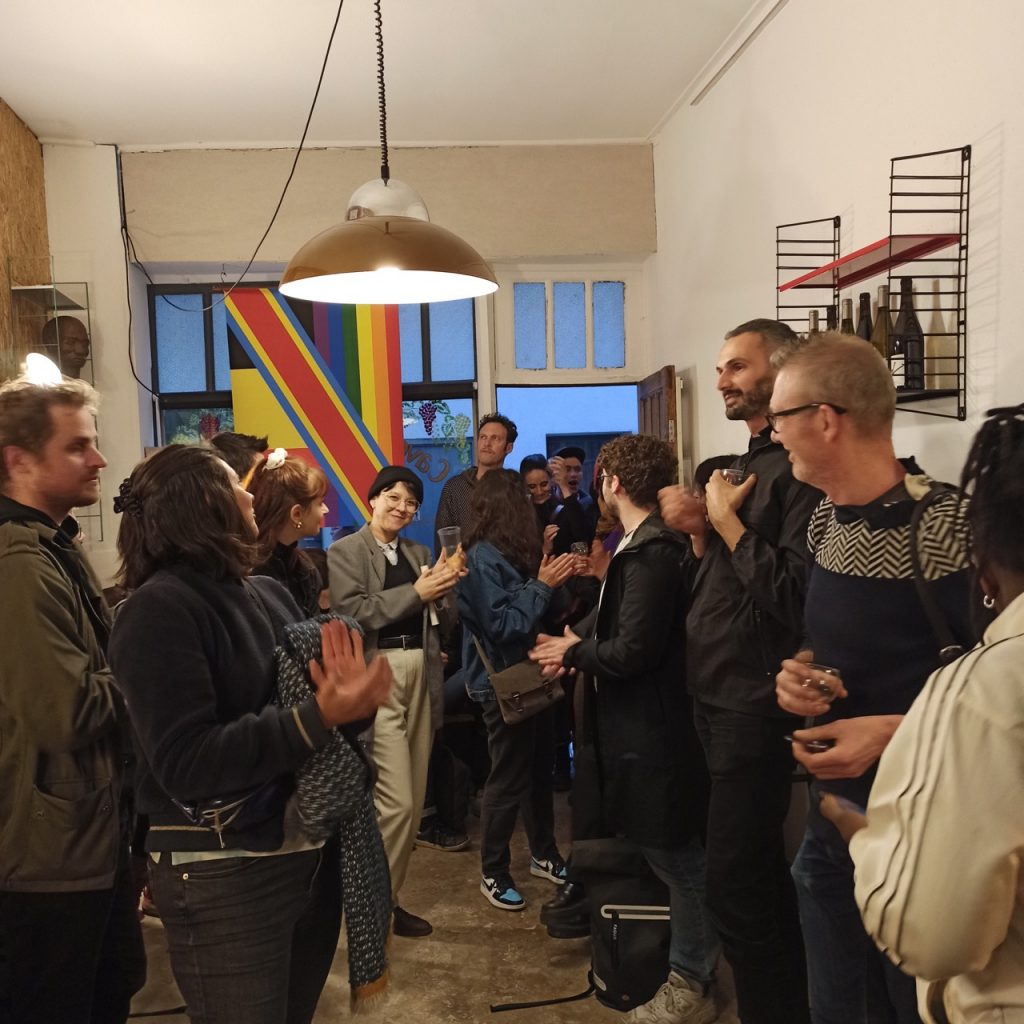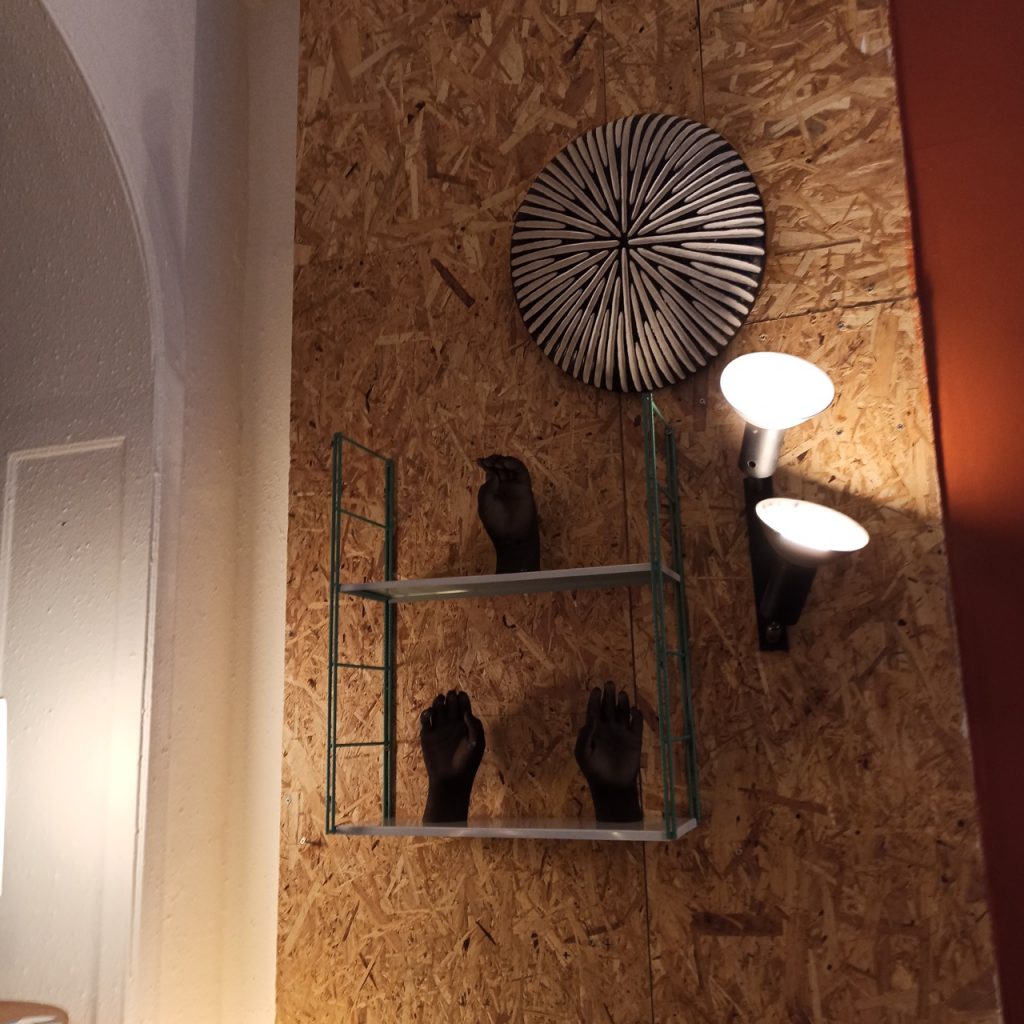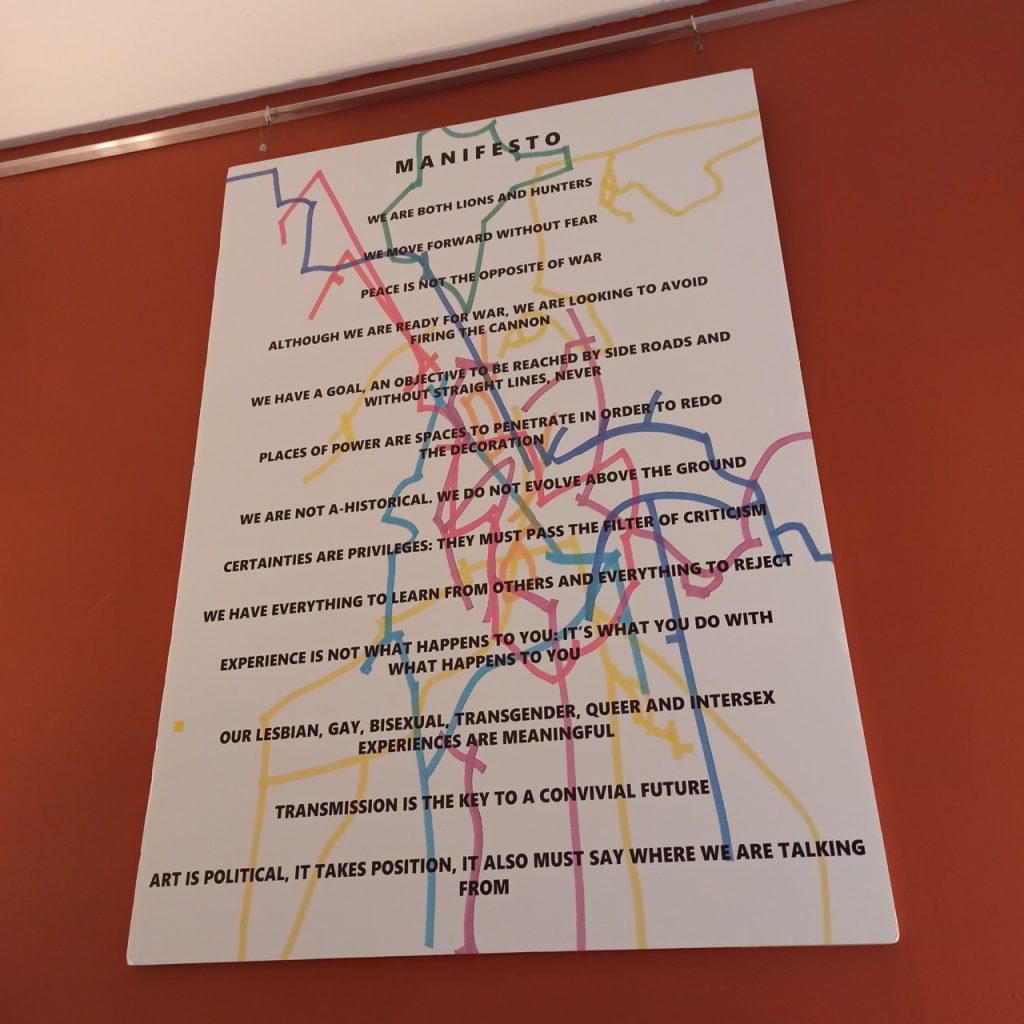March 29, 2022
L’Annexe, Rue du Chevreuil 24l, 1000 Brussels
Prof. Marina Grzinic (Academy of Fine Arts Vienna) with invited artists and guest speakers Joëlle Sambi Nzeba and Nicolas Pommier (Brussels)
Presentation and celebration of the international group exhibition “Stories of Traumatic Pasts: Counter-Archives for Future Memories” (Weltmusem Wien, 8 October 2020 – 3 April 2021; curated by Marina Gržinić, Christina Jauernik and Sophie Uitz), which focused on three European regions, their stories, and their current experiences of collective amnesia in relation to traumatic events from the past: Belgian colonial rule in the Congo, Austria after the “Anschluss” in 1938, and the denial of war crimes since 1990 after the breakup of Yugoslavia.

This was the first public presentation in Brussels of the exhibition and of the catalogue/book released on this occasion. Marina Grzinic (Academy of Fine Arts Vienna) with invited artists and guest speakers Joëlle Sambi Nzeba and Nicolas Pommier (Brussels) reflected on amnesia, coloniality and conviviality and opened a path of thinking toward the ongoing project “Conviviality as Potentiality: From Amnesia and Pandemic towards a Convivial Epistemology” (FWF AR679, 2021–2025).
For this occasion, Sambi Nzeba and Pommier reinstalled their multi-part installation at a community space L’Annexe, with which they participated at the said exhibition. The meaning of their work, entitled C o l o n i a l i t y / C o n v i v i a l i t y ? (2020), was built around the carefully prepared dining table set in an intimate surrounding domestic scene, but within an imperial institution. What awaited the visitor on the table was an uncomfortable confrontation with colonial past. Sambi Nzeba and Pommier asked:
If so many Congolese hands have been cut in the name of a so-called civilization, is it possible to sit at the same table to eat? Is it possible to silence the pain, to ignore the trauma? And how can one start a serene or friendly discussion between victims and perpetrators? There was no recognition by Belgium of the massacres in Congo. No reparation, not even a pardon. We brush conflicts like dust under the carpet, hoping they will disappear. We pretend there is agreement by sharing a recipe for chicken with moambe in the name of “ntango tozalaka,” the good old days… the good old days of la Belgique à Papa, paternalistic Belgium. What is possible to overcome in such conditions? Peace is not the absence of bloody cannons and battlefields, it can have the appearance of “living together” and yet claim as many victims as war. Peace is not the opposite of war. Silence is death. The negation of the other is death. The continuous erasure of the history, identity, and even of the very humanity of people is leading to war. We are at war in our bodies, in our minds even in (the absence of) our representations.” (Sambi Nzeba and Pommier 2020, 92)
At L’Annexe, we see Congolese Hands not served on the table as in their previous installation, but now integrated in a communal space as objects on the wall shelf, as something of a reminder of a colonial past, yet again reminiscing Occidental logic of representing the world as an artifact, of putting to death all otherness it produced through this very act of representing and sterilizing its own procedures of othering.


We see Conviviality Flag hanging of the window near the entrance. They insist:
Moving to a friendly postcolonial society means doing memory work, recognizing the victims or, at the very least, not minimizing and ignoring the crimes committed. Otherwise, we find ourselves forced, executioners as victims, to live with our identities in fragmentation. Even if the consequences are not the same for the latter.” (92)
And we see The Manifesto on the wall answering to a question “So, is conviviality possible? Conviviality far from what we used to know, to see, and to do, and redo. We bet it is possible” (92).
Works cited: Joëlle Sambi Nzeba and Nicolas Pommier. 2020. “C o l o n i a l i t y / C o n v i v i a l i t y ?.” In: Stories of Traumatic Pasts: Colonialism, Antisemitism, and Turbo-Nationalism. WMW Exh. cat. Edited by Marina Gržinić, Jovita Pristovšek, Sophie Uitz, and Christina Jauernik, 86–95. Berlin: Hatje Cantz Verlag.
bios
Marina Grzinic is a philosopher, theorist and artist. She serves as a professor and research adviser. Since 2003, she is a Professor at the Academy of Fine Arts Vienna, Austria. Grzinic is a co-curator of the exhibition “Stories of Traumatic Pasts: Counter-Archives for Future Memories” (Weltmusem Wien, 8 October 2020 – 3 April 2021), and a lead researcher in arts-based research project “Genealogy of Amnesia: Rethinking the Past for Future Conviviality” (FWF AR439, 2018–2021) and “Conviviality as Potentiality: From Amnesia and Pandemic towards a Convivial Epistemology” (FWF AR679, 2021–2025).
Nicolas Pommier is an anthropologist and videographer by training. He now directs his projects towards sound practice, both documentary and experimental. On one hand, he is interested in speech, in its liberation and its collection, in the reflection process that he shares with the author and artist Joëlle Sambi Nzeba on postcolonial situation and migratory question. On the other hand, it is the appreciation, appropriation, and restitution of sound by humans in their environment that arouses his curiosity. soundcloud.com/appletree-project
Joëlle Sambi Nzeba is a poet, writer, and performer. She was born in Belgium, grew up partly in Kinshasa (Congo) and currently lives in Brussels. She is active in a feminist movement. She is an award-winning author of fiction: Le Monde est gueule de chèvre (The world is a goat mouth; novel; 2007), Religion ya kitendi (The fabric’s religion; short-story; 2005), and Je ne sais pas rêver (I can’t dream; short-stories; 2002). Sambi Nzeba questions situations of powerlessness in social matters and raises questions about identity, belonging, and the mainstream, themes she has developed particularly in her slam poetry and with the group Congo Eza!
